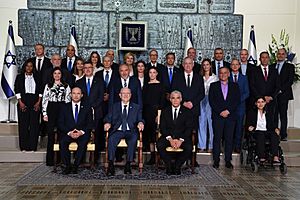Naftali Bennett facts for kids
Quick facts for kids
Naftali Bennett
|
|
|---|---|
|
נַפְתָּלִי בֶּנֶט
|
|
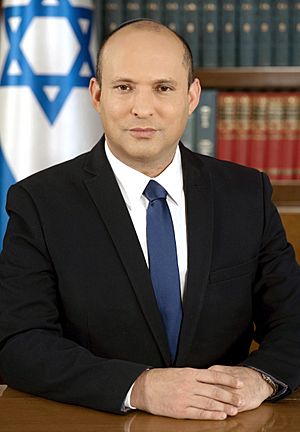
Official portrait, 2021
|
|
| 13th Prime Minister of Israel | |
| In office 13 June 2021 – 30 June 2022 |
|
| President | |
| Alternate | Yair Lapid |
| Preceded by | Benjamin Netanyahu |
| Succeeded by | Yair Lapid |
| 3rd Alternate Prime Minister of Israel | |
| In office 1 July 2022 – 8 November 2022 |
|
| Prime Minister | Yair Lapid |
| Preceded by | Yair Lapid |
| Succeeded by | Office vacant |
| Ministerial roles | |
| 2013–2015 | Economy |
| Religious Services | |
| 2013–2019 | Diaspora Affairs |
| 2015–2019 | Education |
| 2019–2020 | Defense |
| 2021–2022 | Community Affairs |
| Faction represented in the Knesset | |
| 2013–2018 | The Jewish Home |
| 2018–2019 | New Right |
| 2019 | Yamina |
| 2019–2020 | New Right |
| 2020–2022 | Yamina |
| Personal details | |
| Born | 25 March 1972 Haifa, Israel |
| Political party | New Right (2018–present) |
| Other political affiliations |
|
| Spouse |
Gilat Bennett
(m. 1999) |
| Children | 4 |
| Alma mater | Hebrew University of Jerusalem (LLB) |
| Occupation |
|
| Military service | |
| Branch/service | Israel Defense Forces |
| Years of service | 1990–1996 |
| Rank | Rav seren (Major) |
| Unit |
|
| Battles/wars |
|
Naftali Bennett (born 25 March 1972) is an Israeli politician. He served as the 13th Prime Minister of Israel from June 2021 to June 2022. After that, he was the 3rd Alternate Prime Minister of Israel until November 2022. Bennett led the New Right party from 2018 to 2022. Before that, he led The Jewish Home party from 2012 to 2018.
Bennett was born and grew up in Haifa, Israel. His parents were immigrants from the United States. He served in special forces units of the Israel Defense Forces. After his military service, he became a successful software businessman. In 1999, he helped start a company called Cyota, which was sold in 2005 for $145 million. He also led Soluto, another tech company, which was sold in 2013.
Bennett started his political career in 2006. He worked for Benjamin Netanyahu until 2008. From 2010 to 2012, he directed the Yesha Council. In 2011, he co-founded the My Israel movement. In 2012, he became the leader of The Jewish Home party. In the 2013 election, his party won 12 seats in the Knesset (Israel's parliament). He served as Minister of Economy and Religious Services from 2013 to 2015. Then, he became Minister of Education in 2015. In 2018, he formed the New Right party. He later served as Minister of Defense from 2019 to 2020.
In the 2021 election, his Yamina alliance won 7 seats. On 2 June 2021, Bennett agreed to a "rotation government" with Yair Lapid. This meant Bennett would be prime minister first, then Lapid would take over. Bennett became prime minister on 13 June 2021. On 20 June 2022, he announced he would step down. Lapid became prime minister on 1 July 2022, and Bennett became the Alternate Prime Minister. He left politics in November 2022.
Contents
Early Life and Family Background
Naftali Bennett was born in Haifa, Israel, on 25 March 1972. He is the youngest of three sons. His parents, Jim and Myrna Bennett, were American-Jewish immigrants. They moved to Israel from San Francisco in July 1967. Both his parents came from Ashkenazi Jewish families. His father's family was from Poland, Germany, and the Netherlands. His mother's family was from Russia and Poland. Some of his mother's relatives who stayed in Poland were killed in the Holocaust.
Bennett's parents were raised in non-Orthodox Jewish homes. They were active in social movements in the 1960s. Later, they became more religious and followed Modern Orthodox Judaism. They also supported right-wing Israeli politics. After moving to Israel, they learned Hebrew. They settled in Haifa. Jim Bennett worked at the Technion and became a successful real estate businessman. Myrna Bennett worked for an organization helping Americans and Canadians in Israel.
When Bennett was one year old, his family returned to San Francisco. During the Yom Kippur War in October 1973, his father returned to Israel to fight. After the war, the rest of the family joined him. They decided to stay in Israel permanently.
When Bennett was four, his family moved to Montreal for two years for his father's job. They returned to Haifa, where Bennett went to Carmel elementary school. Later, they moved to Teaneck, New Jersey for two years. Bennett attended Yavneh Academy there. The family came back to Haifa when Bennett was ten.
Bennett has two older brothers. Asher is a former submarine officer and businessman. Daniel is an accountant. Bennett went to Yavne Yeshiva High School in Haifa. He was also a youth leader for the Bnei Akiva religious Zionist youth group.
Military Service and Education
Bennett joined the Israel Defense Forces in 1990. He served in the special forces unit called Sayeret Matkal. After his regular service, he was chosen for officer training. He decided to join the Maglan commando unit to become a commander. He became a company commander in Maglan.
Bennett left active service after six years. However, he continued to serve in the reserves. He reached the rank of major. Even when he lived in the United States, he often returned to Israel for reserve duty. Bennett served during the First Intifada and in southern Lebanon. He led many military operations.
After his military service, Bennett studied law at the Hebrew University of Jerusalem. During the Second Intifada, he took part in Operation Defensive Shield. He was also called up as a reservist during the 2006 Lebanon War. He participated in a mission against Hezbollah rocket launchers.
Business Career and Success
In 2000, Bennett moved to Manhattan to start a career in software. In 1999, he co-founded Cyota, a company that made anti-fraud software. He was its CEO. The company was sold in 2005 to RSA Security for $145 million. This made Bennett a millionaire. Part of the deal allowed Cyota's Israeli office to stay open. This created jobs for 400 Israelis in Beersheba and Herzliya.
In 2009, Bennett became the CEO of Soluto. This company offered cloud-based services for computers and mobile devices. Soluto had raised $20 million from investors. In October 2013, Soluto was sold to the American company Asurion for about $100–130 million.
In June 2021, Forbes Israel reported that Bennett might earn $5 million from an investment. He had invested in a financial technology company called Payoneer before entering politics. Payoneer was set to be listed on the Nasdaq stock exchange.
Political Journey
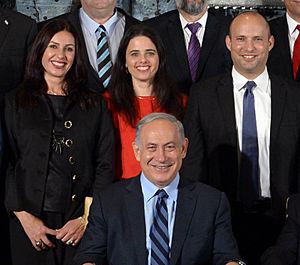
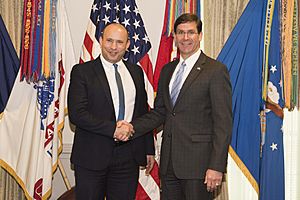
From 2010 to 2012, Bennett was the director of the Yesha Council. In April 2011, he and Ayelet Shaked started My Israel. This group aimed to increase Zionism and improve talks between religious and non-religious people in Israel. In April 2012, he founded another movement called Yisraelim ("Israelis").
Bennett was elected leader of The Jewish Home party in 2012. He was reelected in 2015 and 2017. Before taking his seat in the Knesset, Bennett gave up his U.S. citizenship. He was appointed Minister of Economy and Minister of Religious Services in March 2013. In April 2013, he also became Minister of Jerusalem and Diaspora Affairs.
After being reelected in 2015, Bennett became Minister of Education. He also kept the Diaspora Affairs role. As Education Minister, he made a rule against schools inviting groups that criticize Israel's military actions.
In December 2018, Bennett left The Jewish Home party. He formed a new party called New Right. In the April 2019 election, his new party did not win enough votes. So, Bennett lost his Knesset seat. In June 2019, he was removed from his roles as Education and Diaspora Affairs Minister.
He regained his seat in the September 2019 election. His New Right party was part of the Yamina alliance. In November 2019, Bennett rejoined Netanyahu's government as Minister of Defense. The Yamina alliance reunited in January 2020, and Bennett became its new leader. Yamina won six seats in the 2020 election.
In May 2020, Yamina decided to join the opposition. This ended Bennett's time as Defense Minister. In the March 2021 election, Yamina won seven seats.
Prime Minister of Israel (2021–2022)
On 9 May 2021, reports said Bennett and Opposition Leader Yair Lapid were close to forming a new government. This new government would replace Prime Minister Benjamin Netanyahu. On 30 May, Bennett announced he would be prime minister in a "rotation government." He would serve until August 2023, then Lapid would take over. Bennett was sworn in on 13 June. He was Israel's first prime minister who wears a kippah.
When his government started in June 2021, it had 61 seats in the Knesset. On 6 April 2022, a member of his Yamina party left the coalition. This made the government lose its majority in the Knesset. On 13 June, another Yamina member left. On 20 June, Bennett and Lapid announced they would dissolve the Knesset. Lapid would become the temporary prime minister. The Knesset was dissolved on 30 June, ending Bennett's time as Prime Minister.
COVID-19 Pandemic Response
When Bennett became prime minister, the COVID-19 pandemic in Israel had slowed down. Many Israelis had received two or more COVID-19 vaccines. Soon after, Israel saw a new outbreak of the Delta variant. Bennett encouraged people to keep their distance and urged vaccination for everyone aged twelve and older. He also made a deal with Pfizer to get vaccines sooner.
Israel saw a rise in COVID cases in late 2021. By December, the Omicron variant appeared. The government limited air travel and encouraged vaccination for children and teenagers. In January 2022, a fourth vaccine shot was approved for people aged 60 or older. Cases grew in January, then started to fall. Israel ended its mask mandate in late April.
Foreign Policy and International Relations
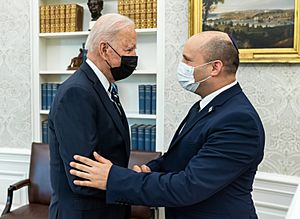
King Mohammed VI of Morocco congratulated Prime Minister Bennett. Bennett said he would work to strengthen relations between Israel and Morocco. Israel and Morocco had restored diplomatic ties in December 2020. In August 2021, they agreed to open embassies in Tel Aviv and Marrakesh.
In August 2021, Bennett visited the United States for the first time. He met with US officials like Secretary of State Antony Blinken and Secretary of Defense Lloyd Austin. He also met President Joe Biden.
On 27 September, Bennett spoke at the United Nations. He talked about fighting the pandemic and political disagreements. He also criticized Iran for supporting terrorism. He warned about Iran's efforts to get nuclear weapons. He said Israel would not allow it.
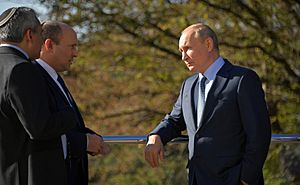
On 12 December, he visited the United Arab Emirates. This was the first visit by an Israeli Prime Minister to the country. He met with the crown prince of Emirate of Abu Dhabi, Mohamed bin Zayed. On 14 February 2022, he visited Manama, Bahrain. This was also a first for an Israeli Prime Minister.
On 5 March 2022, Bennett met with Russian President Vladimir Putin. They discussed the Russian invasion of Ukraine. This meeting was coordinated with the United States, France, and Germany. The Kremlin said Bennett offered to help mediate between Putin and Ukrainian president Volodymyr Zelenskyy. Bennett then flew to Germany to brief German chancellor Olaf Scholz. He also spoke with French President Macron and Zelenskyy.
Alternate Prime Minister and Life After Politics
After his term as prime minister ended, Bennett became the Alternate Prime Minister of Israel on 30 June 2022. On 29 June 2022, Bennett announced he would not run in the next election. He decided to retire from politics after his term as Alternate Prime Minister ended. He resigned from this position on 6 November, with his term officially ending two days later. After retiring, Bennett joined the board of directors of an Israeli tech company called Quantom Source in May 2023.
In September 2024, news reports suggested that he might return to politics. The Israeli Public Broadcasting Corporation later confirmed that he plans to come back to politics.
Political Views
Bennett's political views have been called "ultra-nationalist." He has described himself as "more right wing" than Benjamin Netanyahu. He has also been seen as a "pragmatist" or "opportunist." He does not support the creation of a Palestinian state. He also supports cutting taxes.
Israeli–Palestinian Conflict Views
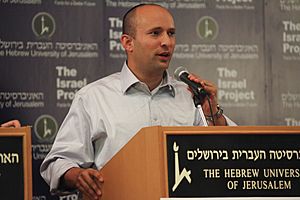
In February 2012, Bennett shared a plan for the Israeli–Palestinian conflict. It was called "The Israel Stability Initiative." He was against creating a Palestinian state. He said he would do everything to make sure it never happened.
In January 2013, Bennett suggested dividing the Palestinian territories. Israel would take over Area C, where many Israeli settlements are. Authority over the Gaza Strip would go to Egypt. Area A and Area B would stay with the Palestinian National Authority. However, the Israel Defense Forces and Shin Bet would keep security control. This was to prevent terrorism and stop Hamas from taking over. He also wanted to invest in roads and industrial zones. He believed that "peace grows from below" through people working together.
In June 2013, Bennett said Israel should learn to live with the Palestinian issue. He compared it to a person living with a piece of shrapnel (a small metal fragment) that is too risky to remove. He meant that some problems are better managed than trying to fix them perfectly.
In October 2016, Bennett said that Judea and Samaria (the West Bank) should become part of Israel. He believed Israel should act on this dream. In November 2016, he said that Donald Trump becoming US President gave him hope. He thought it meant the idea of a two-state solution (Israel and a Palestinian state) would no longer be considered. He stated, "The era of the Palestinian state is over."
Despite his strong right-wing views, when he was forming a unity government in 2021, Bennett agreed to a policy. He would not annex any territory in the West Bank. He also agreed not to build any new settlements while he was prime minister.
Economy and Society Views
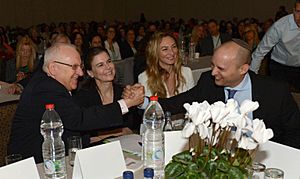
Bennett believes the government should have less control over private businesses. He thinks private companies drive economic growth. He also supports helping vulnerable people like the elderly and disabled. Bennett has said Israel needs to break the power of large companies, big labor unions, and the Ministry of Defense. He believes they are holding back Israel's economy. He thinks that investing in education in poorer areas can help people succeed.
As Economy Minister, Bennett changed Israel's trade strategy. He aimed to increase trade with new markets around the world. This was to reduce trade with the European Union. He wanted to take advantage of new opportunities and reduce the EU's influence on Israel. Under his leadership, the Economy Ministry opened new trade offices in Asia, Africa, and South America. He also started talks with Russia and China for free trade agreements.
Bennett worked to lower Israel's high food prices. He reduced import taxes and other barriers. This helped create more competition in the food industry. These changes helped food prices go down starting in April 2014. Bennett also pushed to help Haredi men join the workforce. He believes this will boost economic growth. He also wants to increase employment among Israeli-Arab women. In October 2021, his government approved plans to spend billions to improve conditions for Israel's Arab minority.
Bennett follows Orthodox Judaism. He is against allowing same-sex marriage in Israel. However, he supports equal rights for same-sex couples, like tax breaks. After a tragic event at the Jerusalem gay pride parade in 2015, Bennett, who was Education Minister, told his ministry to create programs to prevent future attacks on the LGBTQ community. He said, "We are responding to this attack with actions and not just talk."
Personal Life
Bennett's wife, Gilat, is a professional pastry chef. She was not religious before, but now she observes the Sabbath and kashrut (Jewish dietary laws). The couple has four children. They live in Ra'anana, a city north of Tel Aviv. Their oldest son, Yonatan, is named after Yonatan Netanyahu. Their youngest son, David Emmanuel, is named after Emmanuel Moreno, who was a friend of Bennett's in the special forces. Bennett follows Modern Orthodox Judaism.
See also
 In Spanish: Naftalí Bennett para niños
In Spanish: Naftalí Bennett para niños
- List of Israeli politicians
 | Lonnie Johnson |
 | Granville Woods |
 | Lewis Howard Latimer |
 | James West |


